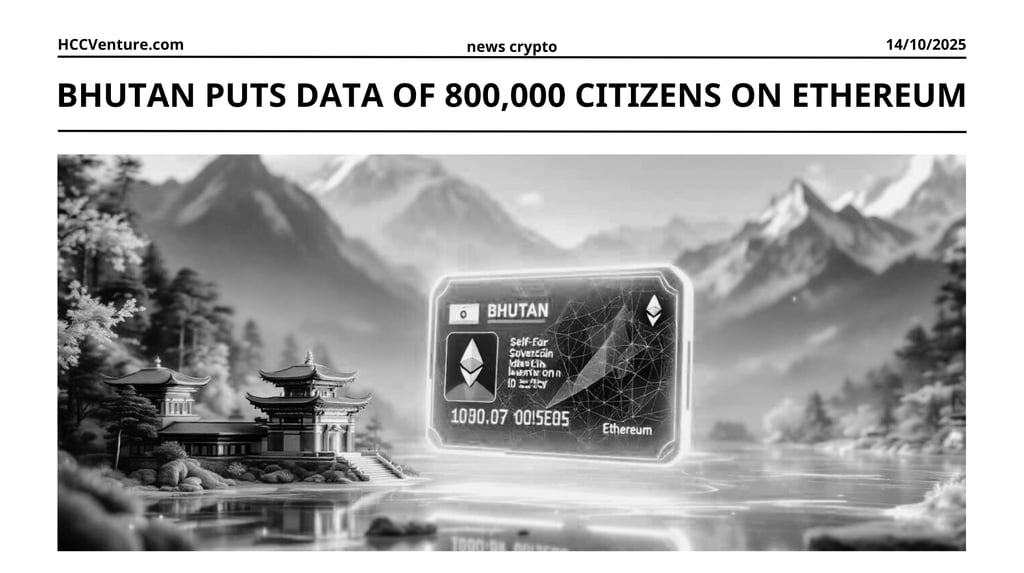Bhutan puts data of 800,000 citizens on Ethereum - making history
The Kingdom of Bhutan has anchored its entire National Digital Identity (NDI) system – covering nearly 800,000 citizens – directly onto the Ethereum blockchain, migrating from Polygon.
10/14/20252 min read


Marking the history of the Ethereum chain
Bhutan, a Himalayan nation long known for its unique development philosophy centered on Gross National Happiness (GNH), has in recent years embraced a cutting-edge technology agenda led by Druk Holding & Investments (DHI), Bhutan’s national investment arm. The integration of citizen IDs into the Ethereum blockchain builds on Bhutan’s broader ambition to build a digital economy, leveraging Web3, AI, and blockchain as tools for transparent governance and inclusive growth.
Unlike most national digital ID programs, which rely on centralized government databases, Bhutan's approach decentralizes data management through Ethereum's cryptographic infrastructure, ensuring security, immutability, and interoperability between government and financial systems.
The new Bhutan Digital Identity (BDI) system uses Ethereum smart contracts to authenticate and verify personal information, allowing citizens to securely prove their identity on:
Government services (taxes, voting, health care, education).
Financial system (banking, credit, remittances).
E-commerce and cross-border verification.
Data privacy is protected through zero-knowledge proofs (ZKPs), which allow users to confirm their identity attributes—such as age or nationality—without revealing personal data. Governments maintain limited oversight powers for compliance and public administration, but no single entity can alter or delete individual records, ensuring identity sovereignty cannot be tampered with.
From Polygon Pilot to Ethereum Anchor
Bhutan's NDI, launched in 2023 on Polygon to save costs, has evolved into a fully Ethereum-integrated system, with the Royal Government Digital Agency overseeing the transition to the mainnet for enhanced interoperability and security. By Q1 2026, all authentication data for the kingdom's 800,000 residents will be converted, allowing for the use of zero-knowledge proofs for privacy-protecting verification—for example, proving age for a loan without revealing full information. Early users, with more than 200,000 as of March 2025, have already taken advantage of the system to open bank accounts and check land registries, cutting paperwork by 80%.
Vitalik Buterin's trip in October was symbolic: When the Ethereum co-founder toured Thimphu, he praised the system as "a model for decentralized identity in developing economies," highlighting its tamper-proof capabilities amid growing cybersecurity threats. The move, with gas costs under $1 million (thanks to the L2 implementation), underscored Bhutan's pragmatic shift to Web3—prioritizing scalability over hype.
Impact on new trends
By embedding citizen identities on Ethereum, Bhutan is positioning itself as a global pioneer in blockchain-based governance, demonstrating that public networks can be securely harnessed for national infrastructure. This project could inspire other countries to consider hybrid public-private blockchain models for digital identities, especially in regions exploring e-Government 3.0 frameworks.
This system truly gives citizens ownership of their digital identities, in line with the Web3 principle of self-sovereignty. Individuals can control access to their personal data and revoke third-party access at any time — a major step towards user-centric governance.
By choosing Ethereum — the world’s most widely adopted smart contract platform — Bhutan ensures its national identity can interact with international financial, educational, and digital ecosystems, paving the way for cross-border payments, digital passports, and decentralized finance (DeFi) integration within regulated frameworks.
Disclaimer: The information presented in this article is the author's personal opinion in the cryptocurrency field. It is not intended to be financial or investment advice. Any investment decision should be based on careful consideration of your personal portfolio and risk tolerance. The views expressed in this article do not represent the official position of the platform. We recommend that readers conduct their own research and consult with a professional before making any investment decisions.
Explore HCCVenture group
HCCVenture © 2023. All rights reserved.


Connect with us
Popular content
Contact to us
E-mail : sp_contact@hccventure.com
Register : https://linktr.ee/holdcoincventure
Disclaimer: The information on this website is for informational purposes only and should not be considered investment advice. We are not responsible for any risks or losses arising from investment decisions based on the content here.


TERMS AND CONDITIONS • CUSTOMER PROTECTION POLICY
ANALYTICAL AND NEWS CONTENT IS COMPILED AND PROVIDED BY EXPERTS IN THE FIELD OF DIGITAL FINANCE AND BLOCKCHAIN BELONGING TO HCCVENTURE ORGANIZATION, INCLUDING OWNERSHIP OF THE CONTENT.
RESPONSIBLE FOR MANAGING ALL CONTENT AND ANALYSIS: HCCVENTURE FOUNDER - TRUONG MINH HUY
Read warnings about scams and phishing emails — REPORT A PROBLEM WITH OUR SITE.
